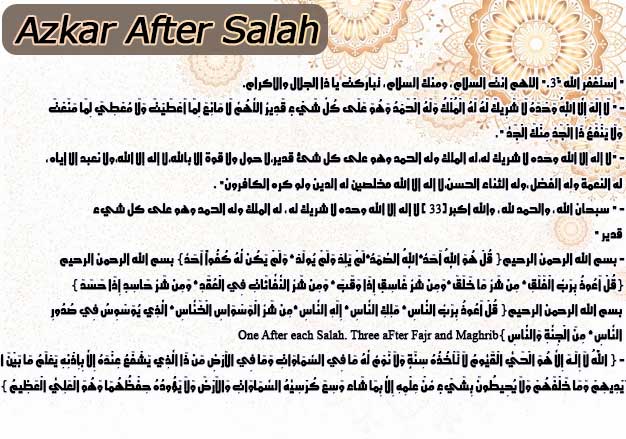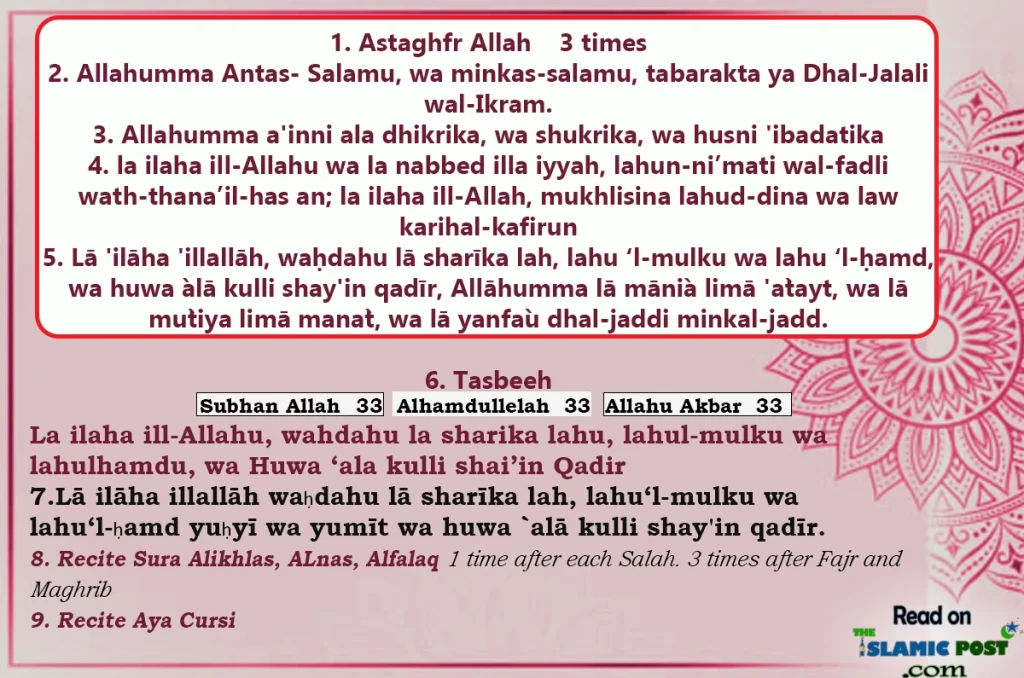
The prophet Mohamed PBUH did not use to Make a specific Dua after Salah. There is no Hadith about making Dua after Salah in Sunna, instead, the prophet used to Say Istghfar three times. Astaghferu Allah (استغفر الله). Then says that Azkar after Salah which you can read down here from Hadith of the Prophet Salla Allahu Alihi Wasalm.
What is the difference between Dua, Zikr, and Azkar?
Dua is a prayer of invocation, supplication, or a request from Allah to ask for help or assistance.
Zikr is the remembrance of Allah by repeating certain expressions or phrases.
Azkar is the plural of Zikr. It is a group of expressions, Quran Ayat, or Dua that has been said by the prophet at certain times. Morning Azkar, After Salah Azkar.. etc.
Making Dua after Salah
Making Dua After Salah is not one of the recommended Sunna times for making Dua, however, You still can make Dua after Salah if you want to as Dua is allowed to be made at any time and doesn’t have a specific time.
The best times for to make Dua in Salah are: in Sujood, or after saying the last Tashahud and Before Salam. In there three times, It’s recommended to make Dua. There are also other times in which it’s preferred to make Dua covered in one of your articles before.
Read: How to get your Dua accepted by supplicating in certain times and situations
How to make Dua after Salah
It’s better to start by praising Allah and then send blessings upon the prophet. The Prophet ﷺ said: “When any one of you prays, let him begin by praising Allaah, then let him send blessings upon the Prophet ﷺ, then let him ask for whatever he wants.” (Tirmidhi, classed as Saheeh by al-Albaani).
In the following lines, you can read Azkar after Salah which the Prophet used to recite after Salah. You can read and listen to Azkar in light of Haith from Sunna in which he said it.
Azkar after Salah
Read Azkar after Salah in English and a translation of the meaning

| Azkar after Salah translation of meaning | Azkar after Salah in Arabic Hadith |
|---|---|
| Whenever the Messenger of Allah (ﷺ) concluded his prayer, he would beg forgiveness from Allah thrice and then would recite: “Allahumma Antas- Salamu, wa minkas-salamu, tabarakta ya Dhal-Jalali wal-Ikram (O Allah, You are the Grantor of security, and security comes from You. You are Blessing, O You Who have majesty and nobility)!” (Imam) Al-Awza’i, one of the narrators of this Hadith, was asked: “How forgiveness is to be sought?” He answered: “The Messenger of Allah (ﷺ) used to say: ‘Astaghfirullah! Astaghfirullah! (I beseech Allah for forgiveness, I beseech Allah for forgiveness)’.” 1 | كانَ رَسولُ اللهِ صَلَّى اللَّهُ عليه وسلَّمَ، إذَا انْصَرَفَ مِن صَلَاتِهِ اسْتَغْفَرَ ثَلَاثًا، وَقالَ: اللَّهُمَّ أَنْتَ السَّلَامُ وَمِنْكَ السَّلَامُ، تَبَارَكْتَ ذَا الجَلَالِ وَالإِكْرَامِ. قالَ الوَلِيدُ: فَقُلتُ لِلأَوْزَاعِيِّ: كيفَ الاسْتِغْفَارُ؟ قالَ: تَقُولُ: أَسْتَغْفِرُ اللَّهَ، أَسْتَغْفِرُ اللَّهَ. |
| The Messenger of Allah (ﷺ) used to supplicate: “Allahumma inni a’udhu bika minal-ajzi wal- kasali, wal-jubni wal-harami, wal-bukhli, wa a’udhu bika min ‘adhabil- qabri, wa a’udhu bika min fitnatil-mahya wal-mamat [O Allah! I seek refuge in You from helplessness (to do good), indolence, cowardice, senility, and miserliness; and I seek Your Protection against the torment of the grave and the trials of life and death].” Another narration adds: “wa dala’id-daini wa ghalabatir-rijal (And from the burden of indebtedness and the tyranny of men).” 2 | كان رسول الله صلى الله عليه وسلم: يقول: ”اللهم إني أعوذ بك من العجز والكسل والجبن والهرم، والبخل، وأعوذ بك من عذاب القبر، وأعوذ بك من فتنة المحيا والممات“. وفي رواية: ”وضلع الدين وغلبة الرجال” ((رواه مسلم)). |
| The Messenger of Allah (ﷺ) took hold of my hand and said, “O Mu’adh! By Allah I love you, so I advise you to never forget to recite after every prayer: “Allahumma a’inni ala dhikrika, wa shukrika, wa husni ‘ibadatika (O Allah, help me remember You, to be grateful to You, and to worship You in an excellent manner).” 3 | وعن معاذ رضي الله عنه أن رسول الله صلى الله عليه وسلم أخذ بيده وقال: ”يا معاذ والله إني لأحبك” فقال: ”أوصيك يا معاذ لا تدعن في دبر كل صلاة تقول: اللهم أعني على ذكرك، وشكرك، وحسن عبادتك“. |
| “Abdullah bin Az-Zubair used to recite the tahlil following every prayer, saying: ‘La Ilaha Illallah wahdahu la sharika lah, lahul-mulk wa lahul-hamd wa huwa ‘ala kulli shay’in qadir, la hawla wala quwwata illa billahil-‘azim; la ilaha ill-Allahu wa la nabbed illa iyyah, ahlan-ni’mati wal-fadli wath-thana’il-has an; la ilaha ill-Allah, mukhlisina lahud-dina wa law karihal-kafirun (There is none worthy of worship except Allah (SWT) alone, with no partner or associate. His is the Dominion, to Him be all praise, and He is able to do all things; there is no power and no strength except with Allah (SWT) the Almighty. There is none worthy of worship except Allah (SWT), and we worship none but Him, the source of blessing and kindness and the One Who is deserving of all good praise. There is none worthy of worship except Allah (SWT), and we are sincere in faith and devotion to Him even though the disbelievers detest it. ) Then Ibn Az-Zubair said: ‘The Messenger of Allah (ﷺ) used to recite the tahlil in this manner following every prayer.'” 4 | قَالَ كَانَ عَبْدُ اللَّهِ بْنُ الزُّبَيْرِ يُهَلِّلُ فِي دُبُرِ الصَّلاَةِ يَقُولُ لاَ إِلَهَ إِلاَّ اللَّهُ وَحْدَهُ لاَ شَرِيكَ لَهُ لَهُ الْمُلْكُ وَلَهُ الْحَمْدُ وَهُوَ عَلَى كُلِّ شَىْءٍ قَدِيرٌ لاَ إِلَهَ إِلاَّ اللَّهُ وَلاَ نَعْبُدُ إِلاَّ إِيَّاهُ لَهُ النِّعْمَةُ وَلَهُ الْفَضْلُ وَلَهُ الثَّنَاءُ الْحَسَنُ لاَ إِلَهَ إِلاَّ اللَّهُ مُخْلِصِينَ لَهُ الدِّينَ وَلَوْ كَرِهَ الْكَافِرُونَ . ثُمَّ يَقُولُ ابْنُ الزُّبَيْرِ كَانَ رَسُولُ اللَّهِ صلى الله عليه وسلم يُهَلِّلُ بِهِنَّ فِي دُبُرِ الصَّلاَةِ . |
| The prophet said: Whoever glorifies Allah (by saying Subhan-Allah) after every Salat (prayer) thirty-three times, and praises Allah (by saying Alhamdu-lillah) thirty-three times, and exalts Allah (by saying Allahu Akbar) thirty-three times, those are ninety-nine in all, and says to complete a hundred: La ilaha ill-Allahu, wahdahu la sharika lahu, lahul-mulku wa lahulhamdu, wa Huwa ‘ala kulli shai’in Qadir (There is nothing which deserves to be worshipped except Allah Alone Who has no partner; to Him belongs the kingdom, to Him praise is due, and He has power over everything), his sins will be forgiven, even if they are as abundant as the foam of the sea. 5 | مَنْ سَبَّحَ اَللَّهَ دُبُرَ كُلِّ صَلَاةٍ ثَلَاثًا وَثَلَاثِينَ , وَحَمِدَ اَللَّهِ ثَلَاثًا وَثَلَاثِينَ , وَكَبَّرَ اَللَّهُ ثَلَاثًا وَثَلَاثِينَ , فَتِلْكَ تِسْعٌ وَتِسْعُونَ , وَقَالَ تَمَامَ اَلْمِائَةِ : لَا إِلَهَ إِلَّا اَللَّهُ وَحْدَهُ لَا شَرِيكَ لَهُ , لَهُ اَلْمُلْكُ , وَلَهُ اَلْحَمْدُ , وَهُوَ عَلَى كُلِّ شَيْءٍ قَدِيرٌ , غُفِرَتْ لَهُ خَطَايَاهُ , وَإِنْ كَانَتْ مِثْلَ زَبَدِ اَلْبَحْرِ |
After Fajr and Maghrip
اللَّهُمَّ إِنِّي أَسْأَلُكَ عِلْمًا نَافِعًا، وَرِزْقًا طَيِّبًا، وَعَمَلاً مُتَقَبَّلاً ”
لا إله إلا الله وحدهُ لا شريكَ له، لهُ المُلكُ، ولهُ الحمدُ، يُحيي ويميت وهو على كل شيءٍ قدير. (10 times)
(7 times) اللهم أجرني من النار
Listen to Azkar after Salah audio
Downlaod Azkar after Salah in PDF
Conclusion
In this article, we covered the ruling of making Dua after Salah and the Azkar after Salah. After knowing the difference between Dua and Zikr. I hope you benefit from it and don’t forget to share this article with others.
Resources
1- Riyad as-Salihin 1415
Chapter 244: The Excellence of the Remembrance of Allah, Book 15: The Book of the Remembrance of Allah
https://sunnah.com/riyadussalihin:1415
2- Riyad as-Salihin 1474
Chapter 250: Issues regarding Supplications, their Virtues and Supplications of the Prophet (pbuh), Book 16: The Book of Du’a (Supplications)
https://sunnah.com/riyadussalihin:1474
3- Riyad as-Salihin 1422
Chapter 244: The Excellence of the Remembrance of Allah, Book 15: The Book of the Remembrance of Allah
https://sunnah.com/riyadussalihin:1422
4- https://sunnah.com/nasai:1340 Chapter 84: How many times one should recite the tahlil and remembrance after the prayer, Book 13: The Book of Forgetfulness (In Prayer)
5- Bulugh al-Maram
Book 2: The Book of Prayer
https://sunnah.com/bulugh/2/217
